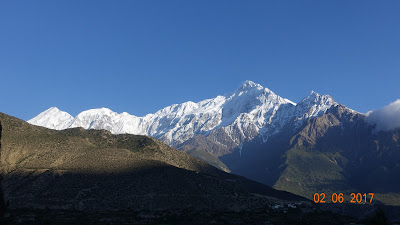śrīviṣṇusahasranāmastotram - dhyānaślokaḥ
kṣīrodanvatpradeśe śucamanivilasat saikate mauktikāyāṃ mālākḷptāsanasthaḥ sphatikamaṇinibhaiḥ mauktikaiḥ
maṇḍitāṅgaḥ ।
śubhrairabhrairadabhraiḥ upariviracitaiḥ muktapīyūṣavarṣaiḥ
ānandī naḥ punīyād arinalinagadāśaṅkhapāṇirmukundaḥ ॥
mukundaḥ - May Mukunda= Vishnu,
ari nalina gadā śaṅkha pāṇiḥ -holding the discus, lotus, mace and conch,
ānandī - with a blissful countenance,
maṇḍitāṅgaḥ - seated
mālākḷptāsanasthaḥ - on a throne bedecked with garlands of pearls,
saikate mauktikāyāṃ śubhrairabhrairadabhraiḥ upariviracitaiḥ muktapīyūṣavarṣaiḥ - shining bright, amindst pearls, dressed up in the copious shower of pearly rain by white clouds in the sky,
śucamanivilasat kṣīrodanvatpradeśe - looking like crystalline pure gems, in the resplendent region of a milky white expanse,
punīyāt naḥ - (May that Vishnu) sanctify us.
This prayer comes at the beginning of Vishnu Sahasranama.
We recited it at Muktinath, a sacred shrine to Vishnu visited by great Sri Vasihnava Saints, at 13000 feet altitude in Nepal Himalayas, also called Saligram for the unique sacred stones available in the Gandaki river there. I immediately felt that this prayer refers in fact to that exact deity in that exact spot, with the word mukti/maukti appearing in all the three lines describing Vishnu's abode.
